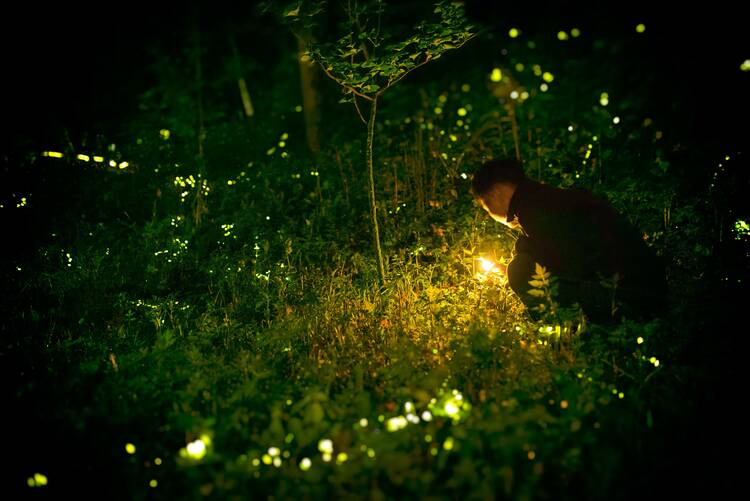A Reflection for the Eighteenth Sunday in Ordinary Time
Isaiah 55: 1-3 Romans 8: 35, 37-39 Matthew 14: 13-21
At dusk in the summer, it was not hard to catch a firefly in a Mason jar. Most kids could catch two, but then the challenge set in: keeping the pair inside the jar while you caught a third. Just as with grasshoppers, you punched holes in the lid of the jar and added grass or leaves so that the fireflies would feel at home and have something to eat. Then you would set the jar on your nightstand, imagining your collection of light growing ever larger. But the fireflies always died, didn’t they? They could not be so easily removed from their surrounding worlds.
I learned the same lesson with a baby cottontail. I do not remember how we stumbled upon it, but that is what kids do in the long days of summer. They stumble upon things. I remember placing the rabbit in a bird cage, again with requisite bits of nature to make it feel at home. My mother helped me to fill with milk the little bottle that came with my sister’s baby doll. But removed from its surrounding world, the little rabbit did not survive.
We like to fancy ourselves as free from an enveloping world. In the modern imagination, we are minds that ride around in our bodies like passengers in vehicles. We know that our bodies have all sorts of needs we must attend, but we view the mind, or soul if you prefer, as essentially solitary and self-sustaining.
But the truth is that our souls cannot step free of their surrounding worlds. Have you ever known a time when you were without a world or there was a world without you? The two are always paired. However brilliant or accomplished we might be, we emerge and always interact with the world around us through the filters of language, culture and experience itself.
Have you ever known a time when you were without a world or there was a world without you? The two are always paired.
Machines can be programmed to classify and respond to all sorts of data, increasingly faster than we can. But there will never be an artificial intelligence. That requires someone who seeks completion of self, fulfillment through interaction with a surrounding world.
Whether the gift comes from God or nature, consciousness is a coupling of a self and a world. If you want to call what computers are being programmed to do “intelligence,” then we would best speak of “understanding” to describe what we humans do. Everything for us lies within the horizon we call the world. It does not for computers. We seek completion of ourselves in the world. Computers never will.
When Isaiah promised that we would be fed, he meant that God would provide more than sustenance for our bodies. And if, some two thousand years ago, Jesus did no more than that, miraculously or not, it would make little difference to us today. Indeed, the Gospels make it clear that Jesus quieted hungry stomachs as a sign of what he could do for starving souls. He would be the sustenance that they would find, beyond themselves, in their enveloping worlds.
We must find our completion in something truly human. “God” is our word for what constitutes the human and exceeds it. Our origin and our destiny. If you do not believe that personal fulfillment, what we call “love,” is the great desire, the silent yet single aim of every human soul, imagine yourself utterly alone in the universe. What would be the point of your existence?
Covid-19 is quite lethal for Christianity. We must plead with the Lord to lift its curse. Our faith tells us that we must gather because the Lord is to be found when even two or three do so, yet Covid-19 curtails congregations. Our faith tells us that we must eat his flesh and drink his blood, that the soul requires sustenance that comes from without, yet Covid-19 makes sharing it into something suspicious. Our faith tells us that we are not pure intelligences, peeking into the world. We are immersed in a world where we must seek each other to find ourselves. Covid-19 would contain us in sealed worlds where we would die as surely as fireflies or cottontails.









